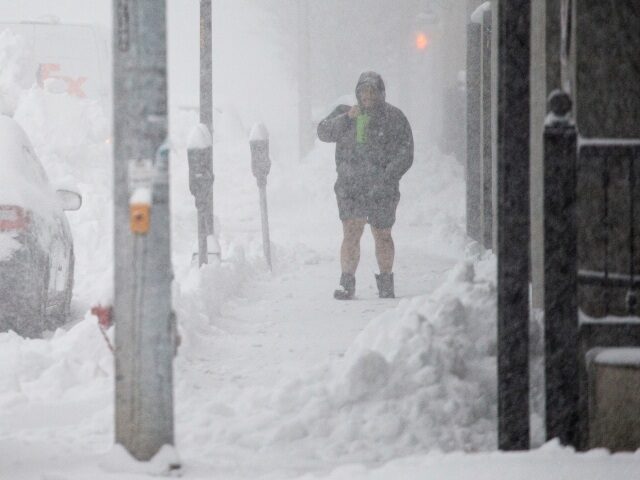Portions of New York state, particularly Buffalo, will see “historic” snowfall this week, according to the National Weather Service (NWS).
According to the National Weather Service (NWS) Buffalo, New York, specifically, could see “potentially historic” snowfall this week.
“Total snow amounts of 1-2 feet are expected in many locations, reaching 2-3 feet east of Lakes Erie and Ontario. Historic snowfall exceeding 4 feet is likely around Buffalo, New York,” NWS warned, noting that “very cold air will accompany this event with temperatures 20 degrees below normal forecast by the weekend”:
Late Thursday night, NWS Buffalo posted an image of the beginning of the snowfall, reporting 3.1 inches of snow in the span of an hour:
NWS Buffalo has continued to put out a number of advisories on a lake effect snow band, affecting counties such as Jefferson and Lewis. For those unfamiliar, the NWS describes a “lake effect” snow as the phenomenon of cold air moving across the waters of the Great Lakes:
As the cold air passes over the unfrozen and relatively warm waters of the Great Lakes, warmth and moisture are transferred into the lowest portion of the atmosphere. The air rises, clouds form and grow into narrow band that produces 2 to 3 inches of snow per hour or more.
According to NBC News, Buffalo Niagara International Airport reported over a foot of snow overnight, and Williamstown reported over two feet.
The harsh winter weather comes roughly a month after a freeze that swept the U.S., as about 100 million Americans were under a freeze or frost alert this time last month:
The harsh winter conditions follow years of panic from global warming alarmists like Al Gore, John Kerry, and countless celebrities who continue to travel via private jet while lecturing everyday Americans about their carbon emissions and vehicles of choice.
As of August, Steven Spielberg’s private jet, for instance, burned roughly $116,000 in fuel since June. And in 2016, climate alarmist Leonardo DiCaprio famously flew 8,000 miles on a private jet to, ironically, accept an environmental reward. That action contradicted his warnings, declaring that “a massive change is required right now, one that leads to a new collective consciousness, a new collective evolution of the human race, inspired and enabled by a sense of urgency.”
In 2006, Al Gore warned that the world would reach a “point of no return” within ten years if it did not take drastic measures to combat climate change. In 2019, he doubled down on that prediction, warning of “much more rapid increases in temperature.”
“The heatwave was in Europe,” he said. “Now it’s in the Arctic.”
Notably, global warming alarmists now tend to use the more broad phrase “climate change,” pointing to extreme weather conditions as evidence of their claims.

COMMENTS
Please let us know if you're having issues with commenting.